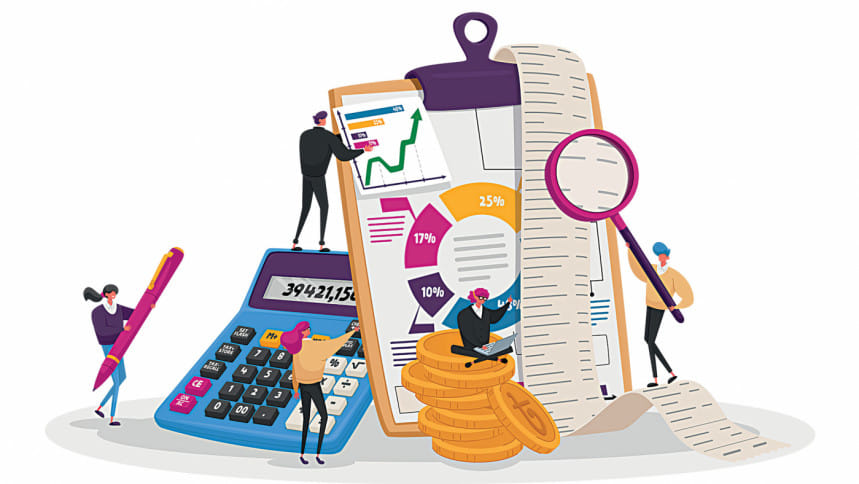Govt to set conservative revenue target

The government is going to set a conservative target for revenue earnings in 2024-25 in order to keep it closer to reality, thus moving away from a tradition that has always seen it chase a goal that was hard to achieve.
The overall revenue generation target will be Tk 537,000 crore in the new fiscal year that begins on July 1. This is 7.4 percent higher than that of the goal of the outgoing financial year.
For 2023-24, the government had aimed at a 15 percent higher revenue generation target. In previous years, the target was also in double digits.
In recent years, economists have always criticised the government for chasing unrealistic targets since the collection remains unmet at the end of the year.
The National Board of Revenue (NBR), which raises 85 percent of revenues for the country, is expected to miss the collection target for the 12th consecutive year in FY24. Recently, the NBR chief also stated that the government had set an unrealistic revenue target without considering its capacity.
Finance ministry officials said the International Monetary Fund (IMF) has suggested undertaking a target that is realistic and achievable. Therefore, the government has been cautious in setting the goals for FY25.
Of the revenue generation target, the NBR will get the task of raising Tk 480,000 crore in the next fiscal year, which is 11.6 percent higher than in FY24.
In FY24, the NBR's tax revenue growth has been fixed at 16 percent. It hovered around 20 percent in previous years.
The IMF placed significant focus on accelerating revenue collections as the country has one of the lowest tax-to-GDP ratios in the world and its foreign exchange reserves have plummeted.
The lender, which is implementing a $4.7 billion loan programme for the country, suggested elevating the VAT rate to 15 percent gradually. The rates range from 3 percent to 15 percent currently.
In the budget to be unveiled on Thursday, the VAT rate will be increased in some sectors. The NBR is expected to expand the coverage of electronic fiscal devices.
In FY25, the government will plan to raise Tk 261,000 crore through VAT against Tk 163,837 crore in the outgoing year, a year-on-year increase of 59 percent.
Receipts from income tax are expected to be 7 percent higher at Tk 164,000 crore.
Economists have always suggested the government concentrate more on income tax instead of VAT because the latter disproportionately impacts the low-income groups. However, the government is not turning back from setting a high target for raising revenue from VAT.
Since the government could not generate non-NBR tax and non-tax revenue as per its plans, it has lowered the targets from the two sectors.
In the next fiscal year, the government will look to earn Tk 12,000 crore in the form of non-NBR taxes, which are 40 percent lower than the FY24's target of Tk 20,000 crore.
The non-tax revenue segment is planned to generate Tk 45,000 crore, which is 10 percent lower than this year's Tk 50,000 crore.
Recently, Sadiq Ahmed, vice-chairman of the Policy Research Institute of Bangladesh, said the emphasis on VAT and duties is a primitive tax system. "We will have to get rid of this mentality."
He said India has raised its tax-to-GDP ratio from 12 percent to 18 percent in five years. "Therefore, raising the ratio is possible."
Bangladesh's tax-to-GDP ratio stood at 7.3 percent in 2022-23.
Ahmed questioned why the personal income tax-to-GDP ratio is only 1.3 percent of GDP, one of the lowest in the world.
He argued the capacity to pay has grown tremendously compared to the 1990s when per capita income was $300 against $2,800 currently.
"This is because the rich don't pay taxes. The system has been framed in a way so that they can skip taxes. Thus, there is a governance problem, an administrative problem, and a systemic problem in the tax system. The tax system must be overhauled."
The noted economist also said penalties for tax non-filing and tax-dodging should be severe.
In Bangladesh, VAT is the biggest source of revenue for the government, accounting for 39 percent of all receipts. Income and personal taxes generate 32 percent, and duties and import taxes fetch 29 percent.


 For all latest news, follow The Daily Star's Google News channel.
For all latest news, follow The Daily Star's Google News channel. 



Comments